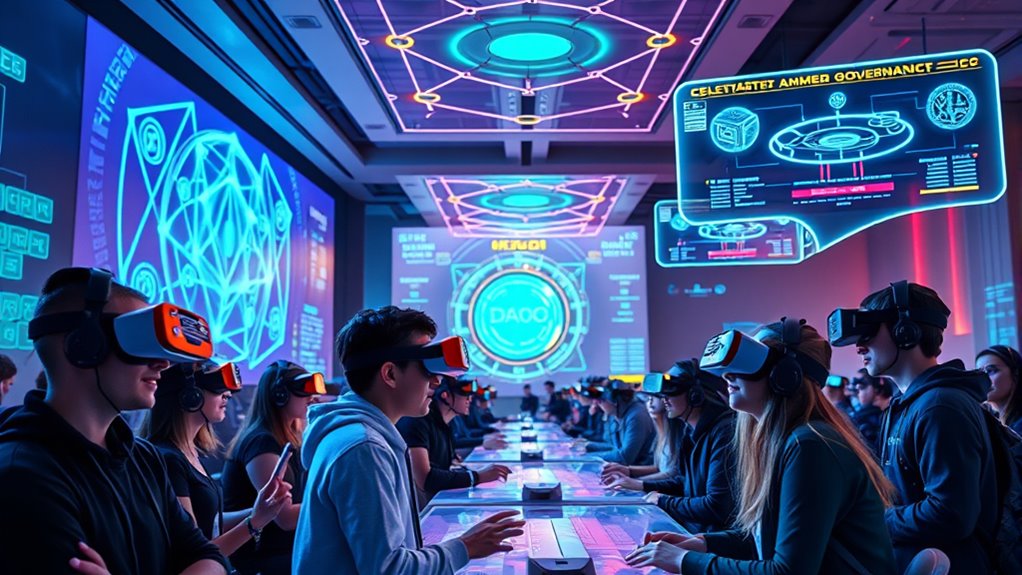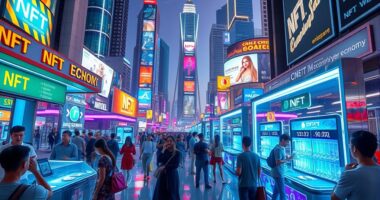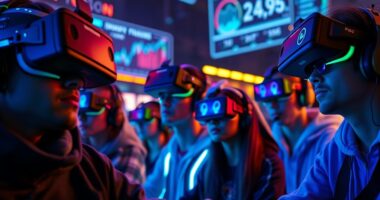Yes, in DAO-governed game worlds, you can truly call the shots. These systems give you direct control through voting and community participation, turning players from mere users into active decision-makers. You can propose changes, influence development, and shape the game’s future collectively. While power dynamics can be complex, well-designed DAOs aim to include everyone. To discover how these innovative worlds are evolving and how your voice makes a difference, keep exploring further.
Key Takeaways
- DAOs enable players to participate directly in decision-making through voting and proposals.
- Community stake via tokens influences governance, giving players real influence over game development.
- Active player involvement fosters ownership, allowing contributions and feedback to shape the game’s evolution.
- Challenges include potential power imbalances favoring wealthy or influential members, risking unfair control.
- Overall, DAO systems aim to democratize game worlds, making players true co-creators with collective decision power.

Decentralized Autonomous Organizations (DAOs) are transforming how game worlds are governed by giving players direct control over development and decision-making. This shift moves away from traditional top-down management, empowering you with a level of player agency that was previously unimaginable. Instead of a handful of developers or corporate executives making all the rules, DAOs implement governance models that let you participate actively in shaping the game’s future. You’re no longer just a player; you become a stakeholder with a voice, influencing everything from content updates to rule changes. This democratic approach aims to create a more immersive and responsive gaming environment where your opinions genuinely matter.
DAOs empower players with a stake and voice, transforming game worlds into democratic, community-driven environments.
In DAO-governed worlds, governance models are key to maintaining transparency and fairness. These models typically rely on tokens or voting rights that give you a say proportional to your stake in the community. When decisions about new features or rule adjustments come up, you can cast your vote—sometimes directly, sometimes through representatives—ensuring that the direction of the game reflects the collective will of its community. This structure encourages collaboration and accountability, as developers and players work side by side to evolve the game. It also reduces the risk of centralized control, which can lead to biases or neglect of community interests.
Your player agency extends beyond mere voting. In many DAO systems, you can propose changes, submit ideas, or even fund new projects within the game ecosystem. This active participation means your feedback isn’t just heard; it can directly influence development priorities. For example, if you feel the game needs a new feature or a balance tweak, you can initiate a proposal, gather support, and see it implemented if the majority agrees. The collaborative governance models foster a sense of ownership and responsibility, making the game a living, breathing entity shaped by its community.
However, this new paradigm isn’t without challenges. Power dynamics can emerge, where those with more tokens or influence sway decisions disproportionately. Ensuring that governance remains fair and inclusive requires careful design and ongoing oversight. But overall, DAO-based governance models are pushing the boundaries of traditional game design, offering you unprecedented control over the worlds you inhabit. By participating in these decentralized systems, you’re not just a player—you’re a co-creator, helping to steer the game toward a future that reflects the collective vision of its community.
Frequently Asked Questions
How Do Voting Rights Work for Casual vs. Core Players?
You might wonder how voting rights differ for casual versus core players. Typically, core players have greater voting power due to higher engagement and more stake in the game, which boosts player engagement. Casual players often face limited voting accessibility, reducing their influence. This setup encourages dedicated participation but can also create imbalance. Balancing voting rights guarantees all players feel valued, fostering a more inclusive environment where everyone’s voice matters.
Can DAO Governance Adapt to Rapidly Changing Game Environments?
You might wonder if DAO governance can adapt to rapidly changing game environments. It’s possible, as it encourages higher player engagement by giving you a voice in decisions. However, governance scalability can be a challenge, especially when quick changes are needed. To succeed, DAOs must develop flexible voting systems and responsive processes, ensuring players’ input remains meaningful even during fast-paced game evolution.
What Safeguards Prevent Malicious Voting or Manipulation?
You might wonder what safeguards prevent malicious voting or manipulation in DAO governance. To address this, smart contract vulnerabilities are minimized through rigorous audits and updates. Additionally, you can bolster voter engagement by incentivizing participation and transparency, making manipulation less appealing. These measures help guarantee that voting remains fair and resistant to malicious attacks, allowing players to genuinely influence game worlds without fearing undue influence or exploitation.
How Are Disputes or Disagreements Resolved Within the DAO?
When disputes happen within a DAO, you rely on community moderation and predefined rules encoded in smart contracts. These contracts undergo thorough audits to prevent vulnerabilities, ensuring fair decision-making. If disagreements arise, members can submit proposals or disputes, which are then reviewed and voted on by the community. This transparent process helps resolve conflicts efficiently while maintaining trust and integrity in the governance system.
Do DAO Decisions Override Developer Control Entirely?
You might wonder if DAO decisions override developer control entirely. In many cases, smart contract security guarantees that DAO rules, like token distribution, enforce community choices. However, developers can still retain control through initial code setups or emergency protocols. While DAOs aim to decentralize decision-making, some level of developer oversight often remains, especially during critical updates or safeguarding against vulnerabilities.
Conclusion
So, while DAO-governed game worlds give you a say in their evolution, true control isn’t guaranteed. You can influence decisions, shape the environment, and even own assets, but the system still relies on collective consensus and technical constraints. It’s a step toward more player-driven experiences, but don’t expect complete freedom. Ultimately, your role is powerful but limited by the rules and the community’s collective will—making it an exciting, yet still evolving, frontier.









